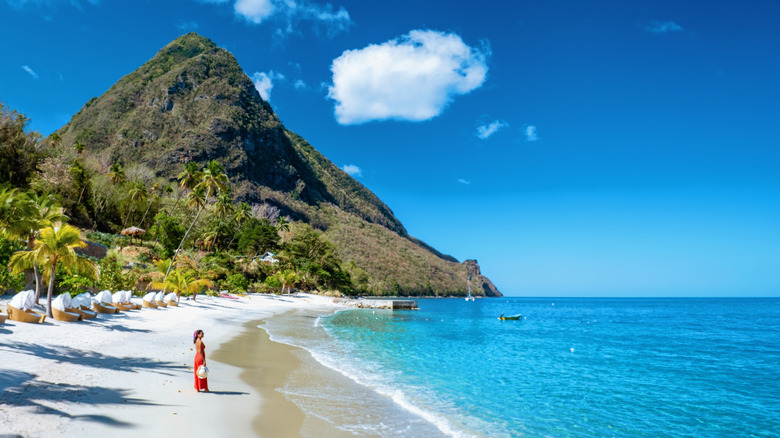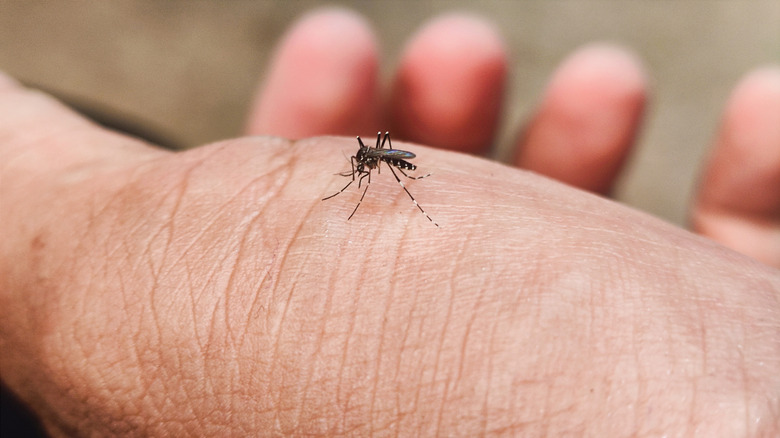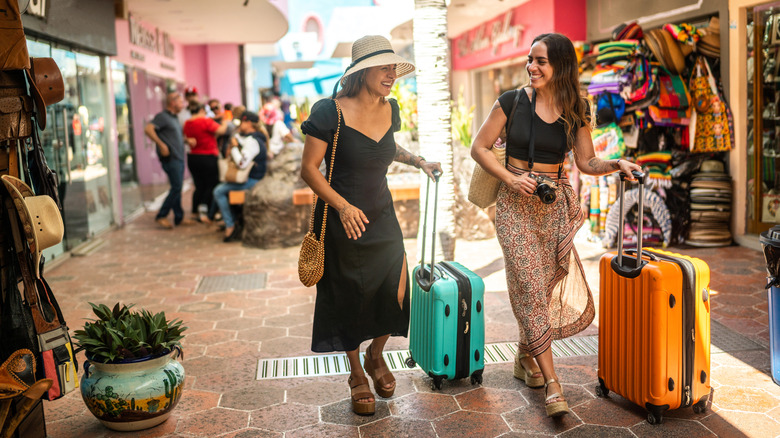The CDC Has Alerted Travelers To A Growing Health Risk In These Dream Vacation Destinations
That beach paradise you've been dreaming about? It might come with an unwelcome souvenir this year. The CDC has recently flagged several popular vacation spots for an increased risk of dengue, a mosquito-borne virus causing fevers, headaches, joint pain, and other symptoms. Dengue frequently appears across the Caribbean, Central and South America, and Southeast Asia. However, the CDC warns of alarming spikes in vacation destinations such as Brazil, Colombia, Guatemala, Mexico, Saint Lucia, and Fiji.
Dengue isn't new — it's believed to have existed for centuries. But why is it suddenly growing? Climate change has created the ideal conditions for mosquitoes to thrive and expand their range. Meanwhile, urban growth provides more breeding grounds and standing water, and a rise in international travel helps the virus spread between communities and continents.
While some destinations have long carried a dengue risk, that risk is increasing. Puerto Rico and the U.S. Virgin Islands saw major outbreaks in 2024 that continued into 2025. The virus is also appearing in places that haven't historically worried about dengue, like regions in Europe, the Eastern Mediterranean, and new parts of South America. To see exactly which locations are currently affected, check the CDC's updated dengue map. But if your dream destination happens to be on the list, don't panic! Unless the CDC states otherwise, you can still go. However, we strongly encourage you to educate yourself and take proper precautions to lower your risk.
What is dengue and why should we be concerned?
Dengue is a mosquito-borne illness, meaning it spreads via mosquito bites, not person-to-person contact like the flu. It's carried by the Aedes mosquito species, which thrives in warm, humid environments, especially in urban areas with standing water. A telltale sign of this mosquito is its white-striped legs (although not all mosquitoes with white-striped legs are this species or carry dengue).
Once infected, symptoms typically start three to 10 days after you've been bitten. The virus has been dubbed "breakbone fever," not because it breaks your bones, but because of its characteristic symptom of intense joint and muscle pain — the kind of stuff that makes you feel as if you were hit by a bus. Other symptoms include fever, severe headache, pain behind the eyes, and a rash. Like most diseases, the symptoms and severity differ depending on the individual's immune system, and some people may have no symptoms at all. Those with mild cases typically take anywhere from one to two weeks to recover, although lingering fatigue is common.
Where this disease differs from many is that subsequent infections aren't necessarily milder; they're often worse. There are four strains of dengue (DENV-1 through DENV-4). If you contract one, you'll develop lifelong antibodies against that particular strain. However, a secondary infection with a different strain is known to cause a heightened immune reaction with more severe symptoms (and potentially hemorrhagic fever).
What to do when traveling to a dengue risk region
Let's face it: Dengue is no walk in the park. But with some planning, you can still enjoy your tropical getaway while minimizing the risk. There are certain things to know before booking that Caribbean vacation or Southeast Asian getaway. For starters, consider when and where you travel. Seasons that are hot, humid, and wet have increased mosquito activity and dengue cases. Check the weather and consider scheduling your trip during drier, cooler months.
Currently, the United States doesn't offer a dengue vaccine for travelers visiting endemic areas. However, mosquitoes are some of the most dangerous creatures in idyllic locations like Fiji or Saint Lucia. When traveling to these at-risk regions, it's best to avoid mosquito bites like the plague — or in this case, like dengue! Pack insect repellent and wear loose-fitting clothing that covers your arms and legs. Create an anti-mosquito environment by using air conditioning and closing window screens whenever possible. Also, don't leave water in flower pots or open bottles since these mosquitoes see water containers as prime egg-laying land.
Finally, keep that immune system strong! Travel fatigue is real, and your immune system often takes a hit. Stay hydrated, pack immune-boosting supplements, and prioritize good sleep. Don't forget to eat healthy, sneaking in extra fruits and veggies when possible. And if you do develop symptoms, don't wait it out. Doctors in dengue regions are used to identifying the disease and providing needed care.


